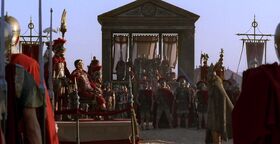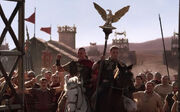As the wars in Gaul finally come to an end, Caesar is faced with both triumph and tribulation. On the heels of his victory comes news of his daughter's death. Awarded with the adulation of the people, he also garners the enmity of powerful opponents and former friends. In Rome, Pompey the Great must balance honor and politics as he is urged to betray an ancient rival and recent friend. Atia of the Julii tries to steer her family on the dangerous path between the growing divisions of power, and in the Gallic countryside, two unlikely allies must reclaim that which Caesar has lost.
Synopsis[]
During the Siege of Alesia in 52 BC, Centurion Lucius Vorenus of the 13th Legion commands his men as Gallic warriors fall on his line. In contrast to the Gauls' chaotic charge, the Roman files fight with machine-like precision – until one legionary, Titus Pullo, breaks ranks and charges into the crowd of Gauls. Vorenus angrily orders him back into formation, but Pullo, perhaps intoxicated, strikes his commanding officer, an offense punishable by death in the Roman army. Pullo is dragged back into the lines by the other legionaries. Later, the assembled soldiers watch as Pullo is flogged and condemned to death. Though his back is torn to bits, Pullo remains full of bravado as he is untied and led away to his holding cell.

Caesar meets Vercingetorix.
The day after the siege, Vercingetorix, Chieftan of the Arverni tribe and "King of all the Gauls", is brought before Julius Caesar and made to surrender. In front of Caesar, he is stripped naked and then forced to kiss a legionary eagle. When he submits and kisses the eagle, Vorenus pulls out his sword and begins to chant, "Caesar! Caesar!" The eight years of the Gallic Wars are over.
In Rome, Caesar's niece, Atia of the Julii has bought a magnificent horse, intending to give it as a gift to Caesar. The horse is delivered to her house by Timon, a Jewish horse-trader living in Rome. Atia is seen having sex with Timon and it is implied that they have a consensual sexual relationship based on Timon's completion of certain tasks that Atia commands.
Following her encounter with Timon, Atia takes a bath and begins a conversation with her teenage son Octavian. She orders Octavian to deliver the horse she has purchased straight to Caesar in Gaul to ensure that he remembers them above all other well-wishers.
In the Roman Senate, Cato the Younger moves that Caesar be stripped of his command and recalled to Rome to answer charges of misusing his office and illegal warmongering. Gnaeus Pompeius Magnus, as sole Consul in Rome, vetoes the motion, insisting that Caesar is his friend. Many Roman senators begin to scream in disgust at Pompey's veto when the veteran Senator and constant moderate Cicero demands the floor. Cicero asks for moderation in the matter, claiming that it is unwise to provoke Caesar in the manner that Cato suggests, but that it is equally unwise to offer Caesar a hand as Pompey is. Pompey, unswayed by the protestations of his fellow Senators, maintains his veto on Cato's motion and leaves the Senate floor, effectively ending that session.
At the theater that night, Scipio introduces his daughter Cornelia Metella to Pompey as a prospective wife. Scipio states that her husband had been killed at the Battle of Carrhae. The meeting between Pompey and Cornelia does not last long as Cornelia states that her presence at such a lewd theater show is inappropriate. while Cato warns him that he must ally against Caesar before it is too late. Pompey publicly asserts again he believes that Caesar means no harm, although privately, Pompey is troubled by Caesar's rising prestige and power. He tells one of his slaves to "kill two birds with one stone" during a planned trip to Gaul. At night in the encampment of the 13th Legion, the Aquila (Eagle Standard) is stolen by brigands. To avoid a potentially disastrous drop in morale, Mark Antony orders Vorenus to retrieve it. Vorenus discovers that the thieves were "Blue Spaniards" headed to a distant corner of Gaul. Feeling his mission to track them down is doomed to failure, Vorenus has the condemned Pullo released from the stockade to assist him.
In camp, Caesar welcomes Marcus Junius Brutus, his unofficial stepson whose mother is Caesar's lover, Servilia of the Junii. Later, at a party hosted by Servilia, Brutus confides to Pompey that the loss of the eagle has made Caesar unusually vulnerable – to hear Brutus tell it, his men are on the brink of mutiny and Caesar is demoralized. On the road to Caesar's camp in Gaul, Octavian is taken captive. At Caesar's request, Atia searches for a suitable wife for the recently-widowed Pompey. She instructs her daughter Octavia to divorce her husband Glabius, despite her protests that they are deeply in love. Atia then presents Octavia to Pompey at a party and offers her for pre-marital relations, which Pompey takes advantage of. Meanwhile, Vorenus and Pullo set off in search of the eagle and encounter and rescue Octavian from his captors. When Vorenus explains who they are, Octavian shows himself to be more shrewd and devious than either he or Pullo. He explains that their mission is only a gesture, since the theft of the eagle is actually a blessing in disguise to Caesar. Civil war between Caesar and Pompey is inevitable, but Caesar needs Pompey to make the first move so as not to appear the aggressor; Pompey is likely to do just that if he believes that Caesar's soldiers are on the verge of deserting him.
As Octavian says that Caesar would prefer the eagle to remain lost, Vorenus and Pullo discover evidence that Pompey ordered its capture. The trio returns in triumph to camp, where a surprised yet

The Eagle is returned to camp.
grateful Caesar takes stock. He has the eagle back, and more than adequate proof of Pompey's hostility. He informs Pompey of his next move: to winter the 13th Legion at Ravenna, on the border with Italy, in preparation for pressing his rights to the Consulship. Pompey breaks his ties with Caesar and takes Cornelia as his wife. Octavia, humiliated at being used by Pompey and heartbroken over her now-pointless divorce, says she wants him dead.
Trivia[]
- The fighting style exhibited by the Roman soldiers in the opening battle is based upon the latest modern research that suggests that Romans fought in constantly revolving ranks, which allowed them to always have a fresh man on the front rank.
- The Newsreader's gestures are reconstructed from detailed descriptions recorded by the famous orator Quintillian in his text titled: "The Elements for Oratory."
- Cato is seen dressed in a black toga. Historically, Cato wore a black toga to express his belief that the ideals of the Roman Republic have died, and thus he was in mourning for Rome.
- The extras who portrayed the Roman senators were local Italians who spoke no English. Because of this language barrier, Bruno Heller has expressed that there was some difficulty in getting them to react correctly to certain lines that the actors were saying.
- The white tunic with broad red stripes that the Senators wear was called a "tunica clava."
- Scipio states that his daughter Cornelia was widowed when her husband fell at the Battle of Carrhae. That battle, fought in 53 BC during Marcus Crassus' invasion of the Parthian Empire, was a tremendous defeat for the Romans.
Quotes[]
- The Newsreader: Under the protection of Pompey Magnus and Julius Caesar, Senate sits tomorrow. Be aware! No disorder will be tolerated.
- Titus Pullo: [after a flogging] Is that it? I was just beginning to enjoy myself.
- Atia: [To Timon] I've always found something perversely erotic about goaty little men.
- Scipio: What a dreadful noise plebs make when they're happy.
- Cato: This is music. Wait until Caesar starts them howling for our blood; then you'll hear something dreadful!
- Vorenus: Fortune pisses on me.
- Titus Pullo: Forculus, if you be the right god for the business here, I call on you to help. If you would open this door, then I would kill for you a fine white lamb, or, failing that, if I couldn't get a good one at a decent price, then six pigeons.
- Atia: The man has tears in his eyes. Tears!
- Octavia: He loves me.
- Atia: A womanish husband is no use to anyone. And your servants! What a fuss! I think you feed them too much.
- Titus Pullo: I have simpler tastes. I like to kill my enemies, take their gold and enjoy their women. That's it. Why tie yourself to one? Where's the flavor? Where's the joy?
- Vorenus: Pullo, when is the last time you had a woman who wasn't crying or wanting payment?
- Pullo: Look here, Mars! Look here, Mars! I am Titus Pullo! These bloody men are my gift to you.
References[]
- Introduction from http://www.tv.com/shows/rome/episodes/
